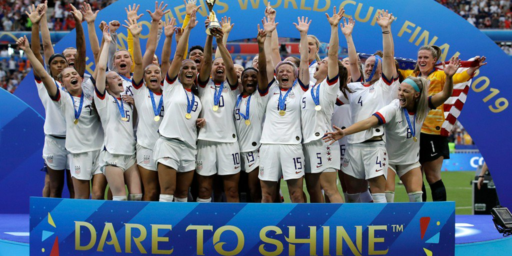Rumsfeld: We’re Winning
SECDEF Donald Rumsfeld has an op-ed in today’s Australian arguing that history is on our side in Iraq.
We look back now at the Cold War as a great victory for freedom. But nothing was certain or preordained.The 50-year span of the epic battle between the free world and the Soviet empire was filled with division, uncertainty, self-doubt, setbacks and failures. Even with our closest allies, there were disputes over diplomatic policy, weapons deployment and military strategies. In the 1960s, France pulled out of NATO’s military organisation altogether. In the US, columnists and editorialists questioned and doubted US policies. There were even instances where US citizens saw their own government challenged as being warmongers or aggressors. But the US — under leaders of both political parties — and our allies showed perseverance and resolve, year after year. The strategies varied, from coexistence to containment to detente to confrontation. Our leaders continued to stand up to what many thought an unbeatable foe, and eventually the Soviet regime collapsed.
That lesson has had to be relearned throughout the ages: the lesson that weakness is provocative, that a refusal to confront gathering dangers can increase, not reduce, future peril and that victory ultimately comes only to those who are purposeful and steadfast. From the outset of this conflict, it was clear that our coalition had to go on the offensive against an enemy without country or conscience.
A little over three years ago, al-Qa’ida was already a growing danger. Its leader, Osama bin Laden, was safe and sheltered in Afghanistan. His network was dispersed throughout the world and had been attacking US interests for years. Three years later, more than three-quarters of al-Qa’ida’s key members and associates have been detained or killed, bin Laden is on the run, many of his key associates are behind bars or dead and his financial lines of support have been reduced. Afghanistan, once controlled by extremists, today is led by Hamid Karzai, who is at the forefront of the world’s efforts in support of moderates versus extremists. Soccer stadiums once used for public executions under the Taliban are today used, once again, for soccer. Libya has gone from being a nation that sponsored terrorists, and secretly sought nuclear capability, to one that renounced its illegal weapons programs, and now says it is ready to re-enter the community of civilised nations. Pakistani scientist AQ Khan’s nuclear-proliferation network — which provided lethal assistance to nations such as Libya and North Korea — has been exposed and dismantled. Indeed, Pakistan, once sympathetic to al-Qa’ida and the Taliban, has under President Pervez Musharraf cast its lot with the civilised world and is a stalwart ally against terrorism. NATO is now leading the International Security Assistance Force in Afghanistan and is helping to train Iraqi security forces. The United Nations is helping set up free elections in both Afghanistan and Iraq. Over 60 countries are working together to halt the proliferation of weapons of mass destruction.
Three years ago, in Iraq, Saddam Hussein and his sons brutally ruled a nation in the heart of the Middle East. Saddam was attempting regularly to kill US and British air crews enforcing the no-fly zones. He ignored 17 UN Security Council resolutions. Three years later, Saddam is a prisoner, awaiting trial. His sons are dead. Most of his associates are in custody. Iraq has an interim constitution that includes a bill of rights and an independent judiciary. There are municipal councils in nearly every major city and in most towns and villages. Iraqis now are among those allowed to say, write, watch, and listen to whatever they want, whenever they want.
Have there been setbacks in Afghanistan and Iraq? Of course. But the enemy cannot win militarily. Their weapons are terror and chaos. They attack any sort of hope or progress to try to undermine morale. They know that if they can win the battle of perception, we will lose our will and leave.
These are difficult times. From the heart of Manhattan and Washington DC, to Baghdad, Kabul, Madrid, Bali, and The Philippines, a call to arms has been sounded, and the outcome of this struggle will determine the nature of our world for decades to come. Today, as before, the hard work of history falls to the US, to our coalition, to our people. We can do it knowing that the great sweep of human history is for freedom — and that it is on our side.
Rumsfeld makes an important point here. While every war is different, making analogies problematic, it’s true that all of our great conflicts have involved substantial periods where victory looked impossible. This was true during both World War Two and the Cold War until very near the end of both. While winning was beginning to look inevitable from a strategic standpoint by 1944, it didn’t seem that way when our troops were storming the beaches at Normandy and Saipan. The Cold War seemed long from over as late as 1988. I suspect Iraq will still look bleak six months before we leave.





Leave Iraq? I believe that Pentagon official sees Iraq as a long termed project like Germany and Japan. Does Japan and Germany look bleak when we left? Oh, we haven’t left yet.
I fully expect US Army base in Iraq by 2050 still.